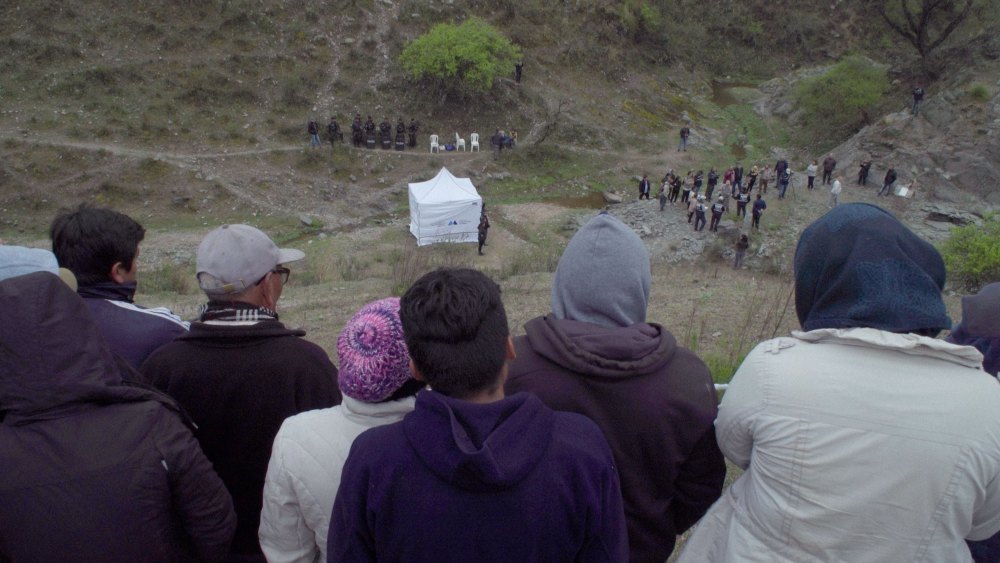Acolytes of Argentine auteur Lucrecia Martel are accustomed to patience. In 25 years she’s made just five features, of which the latest, the long-gestating “Landmarks,” is her first foray into nonfiction filmmaking. A slow-burning, increasingly incensed unraveling of a horrific murder case underpinned by colonialist privilege and prejudice, it too demands patience of its viewers — though it rewards them with steadily rising emotional impact and a long view of Latin American history that transcends any true-crime trappings. Relative to Martel’s more formally radical fiction films, this is a straightforwardly constructed work, but a disciplined, clear-eyed one. Clearly a passion project for the director, it nonetheless avoids sentimentality or heated rhetoric on a high-stakes subject.
Martel’s name guarantees general arthouse exposure for a documentary that will be ubiquitous on the festival circuit following its out-of-competition premiere at Venice, with program slots in Toronto, New York and San Sebastian lined up, plus a place in London’s official competition. No prior familiarity with her oeuvre is required to engage with “Landmarks,” which is accessible and unmannered both in its humane interviewing approach and its to-the-point political commentary. The English-language title feels more oblique and drily distanced than the film is in its approach; its Spanish counterpart, “Nuestra Tierra” or “Our Land,” is closer to the mark.
It begins with an unexpectedly cosmic flourish: a satellite shot of Earth as seen from space, set to ecstatic choral music, before descending into the grassy, undulating slopes, fields and makeshift soccer pitches of northwest Argentina’s Tucumán Province, surveyed by restlessly floating drone. A fertile agricultural region historically inhabited by the Indigenous Chuschagasta people, it has also for centuries been a site of land disputes between those original custodians and settlers of European origin, with whom the Argentine authorities have long sided. These are tensions that continue to play out today, for which Martel presents as evidence the 2009 shooting of 68-year-old Chuschagasta community leader Javier Chocobar — a tragedy prompting a protracted murder trial that gives “Landmarks” its narrative spine.
The three perpetrators are wealthy local landowner Dario Luis Amín and ex-police officers Luis Humberto Gómez and José Valdivieso. Murky but upsettingly brutal candid video shows their fatal confrontation with Chocobar after they served eviction orders to him and 300-odd other Chuschaguasta residents of a sizable patch of ancestral land.
The footage is damning, but that doesn’t simplify the court proceedings, which only began in 2018, nine years after the fact, and culminate in compromised justice at best. Martel, who takes co-writing credit with Maria Alché (her onetime leading lady from 2004’s “The Holy Girl”), isn’t especially interested in fine procedural details, and the film, which mostly dispenses with onscreen names and explanatory chyrons, often leaves its audience to navigate a tangle of conflicting parties and interests, and determine the side of right.
The film’s gaze turns more intimate and particular when it probes the Chuschuaguasta community still reeling from the killing, and gives its most generous platform to Chocobar’s widow Antonia — who speaks lucidly not just about her husband, but about her upbringing as an Indigenous woman and her eternally unstable status in the Argentine population. Still photographs from her personal archive vividly illustrate her descriptions of a persecuted but enduringly proud people, and a hand-built way of life now disappearing before their eyes. Such testaments are crucial in a larger society still slow to ratify their experience: About her schooling, Antonia bemoans the fact that she was never taught Indigenous history. “Instead, they teach us about who discovered America,” she says ruefully.
Earlier in its development, “Landmarks” was conceived as more of a hybrid project built around Chocobar’s story, before Martel evidently decided an untempered documentary form would best serve the blunt facts of the case. You can occasionally feel her filmmaking chafing against the restrictions of nonfiction, or perhaps simply against frustrating truths — her restraint in this regard, however, lends the film a moving humility, not least when it defers to Chuschagasta voices to tell their own story. The director does grant herself one key poetic liberty in the film’s extensive drone photography. An overused affectation in much modern docmaking, it proves an effective and rather enrapturing device here, offering a suitably omniscient view of land that survives all those who fight over it.
